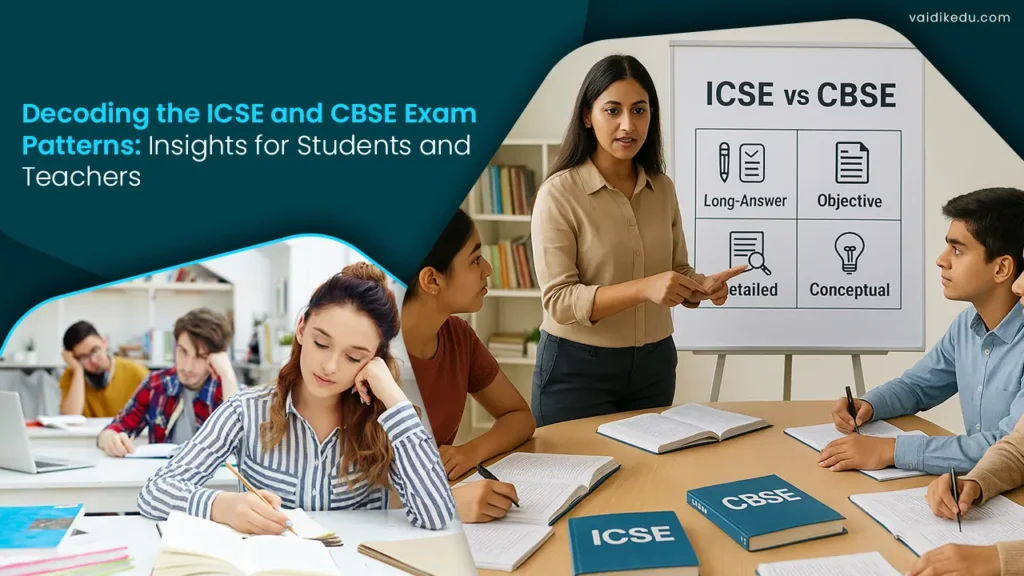The two most dominant education boards in India that shape the academic experience of millions of students are ICSE (Indian Certification of Secondary Education) and CBSE (Central Board of Secondary Education). The curriculum design of both boards differs in their teaching methodologies and examination patterns.
So, knowledge of these differences is required by both students and teachers for proper navigation through their academic journey. This blog will cover the ICSE exam, its uniqueness, and actionable wisdom for students and teachers to ace the CBSE exam pattern.
If the education system has exam patterns, not only will they assess a student’s knowledge, but they will also frame strategies to learn, the teaching approaches, and ultimately the result.
The weightage of the topics, the type of questions, and even the grading system depend on the exam pattern. This understanding can help students focus their preparation while enabling teachers to instruct accordingly.
Understanding The CBSE Exam Pattern
- Curriculum Overview
The curriculum at CBSE is well structured and compact for preparing students to compete in competitive exams like NEET and JEE. Here, the stress on conceptual clarity makes mathematics and science highly systematic subjects.
- Assessment Framework
Format: MCQs, Short Answer Questions, Long Answer Questions.
Internal Evaluation: Practical Examinations and internal assessments hold a huge weightage, especially in subjects such as Science and Computer Studies.
Marks Distribution: Most exams are of 100 marks, and 20-30 marks are awarded for internal assessment in some subjects.
Focus Areas: The focus is on application-based learning and problem-solving skills.
- Evaluation Process
The CBSE exam is centrally evaluated, which helps in standardization. The examiner follows a marking scheme in minute detail, thereby reducing the degree of subjectivity. This process will help the student as he/she can get step marks even for partially correct answers.
- Preparation Insights For Students And Teachers
For Students: Practice last year’s question papers to evolve recurring themes.
Read more of NCERT Textbooks, as most questions are directly taken from them.
Develop problem-solving skills in math and physics.
For Teachers: Ensure your lesson planning accommodates the marking scheme of the exam and question pattern.
Use sample papers by CBSE to enable students to become familiar with exam patterns.
ICSE Exam Pattern
- Curriculum Overview:
The ICSE syllabus is very broad, where equal importance has been given to science, humanities, and language. The curriculum aims at building analytical skills, creativity, and practical knowledge.
- Assessment Framework
Structure: ICSE exams are verbose and have descriptive questions. Objective questions are not more in number, as compared to CBSE.
Internal Assessment: English and History have more on internal projects and assignments, hence the mark comes in the end.
Mark Distribution: Exams are out of 100 and 20% are internal for some subjects.
Focus Areas: The syllabus is more elongated, giving a deeper approach to the study of subjects.
- Assessment Process
The ICSE evaluation system is strict, with minute marking guidelines. Examiners look for clarity, creativity, and precision in the answers provided by the students.
- Preparation Insights For Students And Teachers
For Students: Learn to manage time to handle lengthy papers.Prepare answers with a detailed level of clarity and composition. Expand beyond books as study material.
For Teachers: Advise the students to answer with a comprehensive and composed response.Project-based Learning is suggested as the board is emphasizing internal assessment.
CBSE vs. ICSE Exam pattern
⏩Curriculum Design
- CBSE – Cramped and concept-based
- ICSE – Vast and elaborative
⏩ Exam Format
- CBSE – MCQ and descriptives are balanced.
- ICSE – More Descriptive
⏩ Internal Assessment
- CBSE – 20-30% in some subjects
- ICSE – Regularity in internal testing
⏩ Evaluation
- CBSE – Centralized and Standardized process
- ICSE – Strict with clarity on the product development
⏩ Challenges For Students
- CBSE – Pressure to cope with the competitive exams.
Balancing the theoretical and practical preparation.
- ICSE – The syllabus is too broad to be covered.
Questions that are too subjective.
⏩ Challenges For Teachers
- CBSE – Up-to-date about the curriculum changes.
NCERT concepts are not well understood by the students.
- ICSE – Different pedagogies for such a broad syllabus.
Equilibrium between classroom teaching and project-based learning.
Success Tips
Students
- Prepare a timetable and keep time for revision and practice.
- Use mock tests to simulate conditions.
- Find your tutors for problematic ideas.
Tutor
- Change pedagogy with the different ways of learning and understanding
- Giving constant feedback on how students need to do
- Follow the curriculum revision and new test pattern updates.
Comparative Analysis: ICSE And CBSE
While the broad curriculum objectives of CBSE and ICSE are in conformity with national educational goals, the approaches are different:
- Pedagogical Emphasis
CBSE:
Conceptual understanding is encouraged.
Subjects such as mathematics and science are given more importance and least to arts and languages.
It is ready for a nationwide audience, and thus it can be followed anywhere.
ICSE:
It encourages analytical and creative thinking.
It provides equal emphasis on languages, sciences, and humanities, which makes it suitable for students who have varied academic interests.
Engages students in project-based and activity-oriented learning.
- Examination Patterns
CBSE:
Has application-based questions, especially in science and math.
Focuses on efficiency, clarity, and relevance to competitive exams.
Includes regular updates that are in line with national testing standards like NEET and JEE.
ICSE:
Has detailed, descriptive questions that require in-depth explanations.
Promotes original thinking and creativity.
It is generally known for its high language proficiency standards.
Issues in Adjusting To ICSE And CBSE Exam Patterns
- For Students
ICSE:
The syllabus is too broad for the student
Good time management is needed for descriptive questions
Essay type questions will require a good command of the language
CBSE:
While preparing for the competitive exams, it is a bit tough task to do at the same time.
There are not many places to see other resources since the books in NCERT are so comprehensive.
Although practicals have to be developed there has to be accuracy and clear understanding of them
- For Teachers
ICSE:
Academic contents with project-based learning need to be considered as well
Detailed marking schemes need a lot of accuracy in both teaching and analyzing
CBSE:
Teachers have to adopt time-bound teaching approaches to complete the structured syllabus.
Preparation for boards as well as competitive exams requires two-way learning.
Advanced Techniques For Students
- CBSE Specific Techniques:
NCERT Emphasis: These books are the foundation for CBSE exam preparation, at least for the science and maths.
Mock tests And Sample Paper: These regular practice exercises have helped students catch the trends and improve their ability to manage time.
Objective Question: Prepare thoroughly on multiple-choice questions and short answer questions that seem to be a favorite now
- ICSE Specific Techniques:
Mastering Language: Inhale the words and essay writing skills as English is widely used in ICSE.
Long Answers: Practice structured, explanatory answers with examples.
Internal Assessments: Consider project work as an opportunity for deeper learning of the subject.
- Teaching Techniques For The Teacher
CBSE:
Use technology-based tools like online quizzes and interactive learning platforms to facilitate the review of NCERT concepts.
Regular formative assessments must be undertaken for monitoring the progress done and finding out the weak areas.
Encourage students to use problem-solving techniques for math and physics.
ICSE:
Inculcate creativity through project-based assignments.
Develop the habit in students to think beyond textbooks and use reference books and supplementary materials.
Activities such as debates and group discussions must be included in order to develop language and analytical skills.
Long-Term Benefits of Understanding Exam Patterns
A proper understanding of the pattern of exams will align the preparation strategies of students with the board’s requirements. Teachers can also modify their teaching plans according to these patterns.
Skill Development: Even though CBSE focuses on problem-solving skills and conceptual clarity, ICSE develops analytic skills and creativity. Both provide a proper platform for students to prepare themselves in various skills relevant to higher education as well as professional life.
Preparation For Competitive Exams: CBSE has the alignment of syllabi with competitive exams, which would provide students with a great advantage while preparing for the national-level test. Meanwhile, ICSE has a very wide curriculum to ensure that the student has a base in every subject.
International Acceptance: ICSE is quite widely accepted in the world, and students have a benefit while opting for higher studies abroad. CBSE is also providing strong roots to those students who are keenly interested in Indian competitive examinations.
Future of ICSE And CBSE
Both CBSE and ICSE have been developing to fulfill the needs of change in education. The new reforms currently are skill-based learning, practical application, and competency-based assessments. Within this scenario of globalization of education methods, technology-driven learning and multidisciplinary approaches will also be needed for survival by both boards.
Conclusion
The ICSE as well as the CBSE presents a rich framework of studies keeping in view specific goals for student learning. Since CBSE supports students concentrating solely on the entrance examination, the ICSE offers a full educational activity that builds skills for reasoning as well as originality.
The students maximize their preparation strategy, and the teacher enhances his methods of teaching by knowing the exam pattern of each board. Finally, the students are made capable of all the perspectives so that a student enjoys success throughout their careers and in their studies.
Frequently Asked Questions
CBSE as its syllabus is more compact and NCERT concepts take the place.
Yes, due to its vast syllabus and unique descriptive question types.
Yes, but shifting is not easy because their syllabi and teaching approaches are different.
Teachers can teach with projects in the curriculum and should ask the students to write answers elaborately and structured.
CBSE is preferred by many students due to its structured syllabus and competitive exams.









